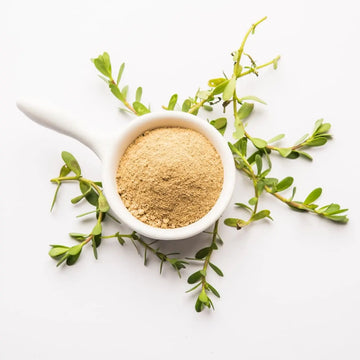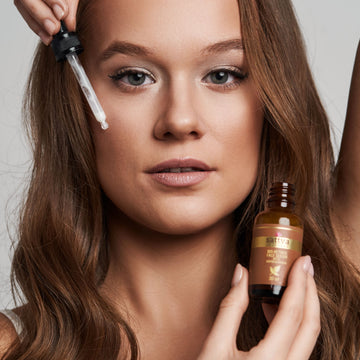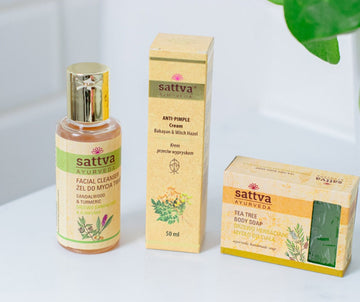The Basics of Natural Acne Care
Anti-acne care is a key element in the fight against acne, regardless of its type and severity. I invite you to read an article that will help you understand the causes and symptoms of acne, as well as learn how to properly care for acne skin with natural remedies. A proper diet and healthy habits are also part of this care.
What is Acne: Causes and Symptoms
Acne is a common skin problem that affects both teenagers and adults. To effectively fight acne, it is worth knowing its causes. causes and acne skin symptoms . Let's focus on the two most well-known types of acne: acne vulgaris and rosacea, as well as the impact of excess sebum on the formation of acne.
What is acne vulgaris and rosacea?
Pimple This is the most common type of acne that usually appears during puberty. It is characterized by the appearance of blackheads, pimples, and redness of the skin. The cause of teenage acne is hormonal changes that lead to increased sebum production and blocked skin pores.
Rosacea is a chronic skin condition that usually affects people over the age of 30. It manifests itself with redness, erythema, spider veins, and the appearance of spots and papules. The causes of rosacea are not fully known, but may be related to genetics, vascular disorders, and immunological reactions.
Causes of acne: excess sebum and sebaceous gland function
Excess sebum is one of the main causes of acne. Sebum is an oily substance produced by sebaceous glands , which are responsible for moisturizing and protecting the skin. However, when sebum secretion is too intense, it can lead to blockage of skin pores, which in turn leads to acne. It is worth paying attention to the work of the sebaceous glands , as their excessive activity may cause skin problems.
Symptoms of acne skin: skin inflammation and imperfections
Acne manifests itself in various ways inflammatory skin changes , such as blackheads, pimples, lumps or redness. Depending on the severity of acne, these changes may be more or less visible. In addition to inflammatory changes, acne can also cause other skin imperfections such as discoloration, scars or enlarged pores. Proper care for acne skin can help minimize these symptoms and improve the appearance of the skin.
Basics of Acne Skin Care
The right one acne skin care is key in the fight against acne. An introduction to the basic principles of care and a discussion of the importance of regular care will allow for a better understanding of how to care for acne-prone skin.
Why is it worth trying natural acne skin care?
Proper care for acne-prone skin brings many benefits. Regular care helps maintain skin balance, reduce inflammation and improve the appearance of the complexion. In the case of I recommend acne skin using appropriate cosmetics that will support skin regeneration processes and soothe irritations.
Step-by-step approach to skincare: cleansing, toning, moisturizing
There are three basic steps to take care of acne skin: skin care steps : cleansing, toning and moisturizing. Each step has its own importance and affects the condition of the skin.
-
Skin cleansing - the first stage, which involves thorough removal of impurities, sebum and makeup. Cleansing should be gentle but effective so as not to irritate the skin.
-
Tonic - the second stage, which aims to restore the skin's pH balance, remove any remaining impurities and prepare the skin for further care. The tonic should contain soothing and antibacterial ingredients.
-
Moisturizing - the third step, which is to provide the skin with the right amount of moisture to maintain its elasticity and healthy appearance. Moisturizers should be light and non-comedogenic so as not to clog pores.
Acne skin care mistakes that can worsen the condition of your skin
There are many ways to care for acne-prone skin. mistakes in care that can negatively affect the condition of the skin. Here are some of them:
-
Using overly aggressive cleansers, which can irritate the skin and lead to increased sebum production.
-
Excessive use of anti-acne cosmetics, which can dry out the skin and lead to the opposite effect - increased sebum production.
-
Squeezing pimples and blackheads, which can lead to infections, scarring and worsening of the skin condition.
-
Inadequate skin hydration, which can lead to dry or oily skin.

A holistic approach to the problem of acne skin
Avoiding the following mistakes and following the step-by-step care guidelines can significantly improve the condition of acne-prone skin and contribute to its healthy appearance.
-
Taking care of acne-prone skin is a real challenge. It is not only a matter of using the right cosmetics, but also changing habits that must become part of your daily routine to achieve real improvement in your skin condition:
-
Regular cleansing is key. Use gentle face washes that don’t dry out your skin. Wash your face twice a day to remove excess sebum and impurities that can contribute to blackheads and breakouts.
-
Choose cosmetics based on natural ingredients such as neem, turmeric, sandalwood, amla or tulsi, which have antibacterial and anti-inflammatory properties.
-
Avoid touching your face to avoid spreading bacteria and contaminants.
-
Moisturizing your skin is very important, even if it is oily. Choose light moisturizing creams.
-
Avoid fatty, processed foods and sweets. Instead, reach for fresh fruits, vegetables, whole grains and healthy fats.
-
Reduce stress through relaxation practices such as yoga, meditation, massage or deep breathing techniques.
Anti-acne cosmetics: what to choose?
Choosing the right ones anti-acne cosmetics is crucial for effective care of acne-prone skin. It is worth getting to know the different types of cosmetics available on the market and finding out which active ingredients are most effective in fighting acne.

Professional Products vs. Natural Care: Which is Better for Acne-Prone Skin?
When it comes to acne skin care, you can choose between: professional products and natural care . Professional products often contain concentrated active ingredients that can bring faster and more visible results. However, they can also be more irritating to the skin, especially with long-term use.
Natural care, on the other hand, is based on the use of cosmetics with natural ingredients, such as vegetable oils, herbal extracts or clays. Natural care may be gentler on the skin, but satisfactory results can be achieved.
It is important to observe the skin's reaction to the cosmetics used and adapt the care to its needs. Using these techniques and products can help to achieve faster skin regeneration after acne and minimize scars and discoloration.
When it comes to acne skin care products , it is worth reaching for: neem herbs, tea tree soap, tea tree essential oil and anti-acne cream.

By following the tips and recommendations presented, you can effectively care for acne-prone skin, minimizing the risk of skin condition worsening and improving its appearance. Remember that each skin is different and may require an individual approach, so it is worth consulting a dermatologist in case of doubts or problems related to acne.
photo: Mint Magazine



